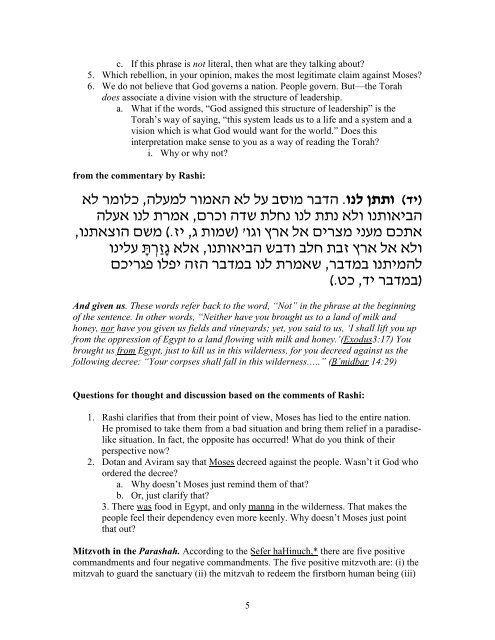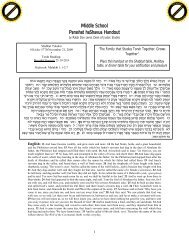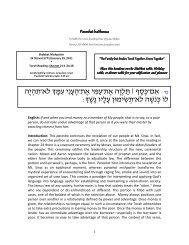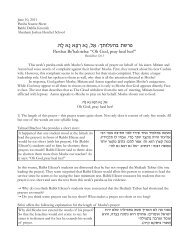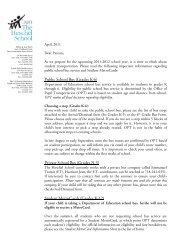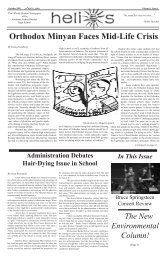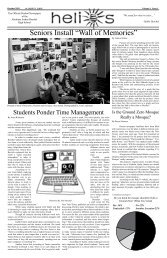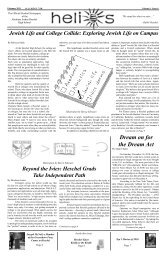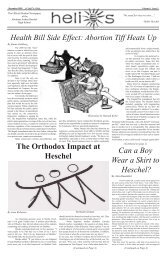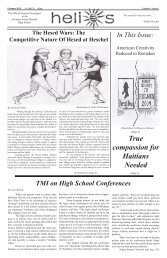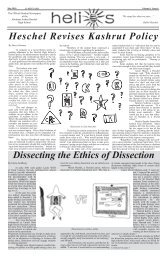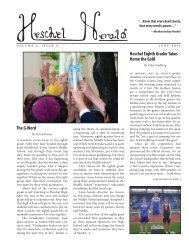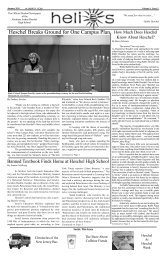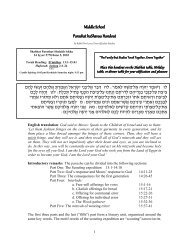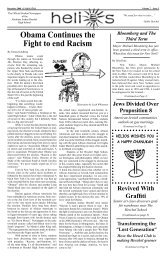Korah - The Heschel School
Korah - The Heschel School
Korah - The Heschel School
Create successful ePaper yourself
Turn your PDF publications into a flip-book with our unique Google optimized e-Paper software.
c. If this phrase is not literal, then what are they talking about?<br />
5. Which rebellion, in your opinion, makes the most legitimate claim against Moses?<br />
6. We do not believe that God governs a nation. People govern. But—the Torah<br />
does associate a divine vision with the structure of leadership.<br />
a. What if the words, “God assigned this structure of leadership” is the<br />
Torah’s way of saying, “this system leads us to a life and a system and a<br />
vision which is what God would want for the world.” Does this<br />
interpretation make sense to you as a way of reading the Torah?<br />
i. Why or why not?<br />
from the commentary by Rashi:<br />
(יד) ותתן לנו. הדבר מוסב על לא האמור למעלה, כלומר לא<br />
הביאותנו ולא נתת לנו נחלת שדה וכרם, אמרת לנו אעלה<br />
אתכם מעני מצרים אל ארץ וגו' (שמות ג, יז.) משם הוצאתנו,<br />
ולא אל ארץ זבת חלב ודבש הביאותנו, אלא גָזַ רְ תָּ עלינו<br />
להמיתנו במדבר, שאמרת לנו במדבר הזה יפלו פגריכם<br />
(במדבר יד, כט.)<br />
And given us. <strong>The</strong>se words refer back to the word, “Not” in the phrase at the beginning<br />
of the sentence. In other words, “Neither have you brought us to a land of milk and<br />
honey, nor have you given us fields and vineyards; yet, you said to us, ‘I shall lift you up<br />
from the oppression of Egypt to a land flowing with milk and honey.’(Exodus3:17) You<br />
brought us from Egypt, just to kill us in this wilderness, for you decreed against us the<br />
following decree: “Your corpses shall fall in this wilderness…..” (B’midbar 14:29)<br />
Questions for thought and discussion based on the comments of Rashi:<br />
1. Rashi clarifies that from their point of view, Moses has lied to the entire nation.<br />
He promised to take them from a bad situation and bring them relief in a paradiselike<br />
situation. In fact, the opposite has occurred! What do you think of their<br />
perspective now?<br />
2. Dotan and Aviram say that Moses decreed against the people. Wasn’t it God who<br />
ordered the decree?<br />
a. Why doesn’t Moses just remind them of that?<br />
b. Or, just clarify that?<br />
3. <strong>The</strong>re was food in Egypt, and only manna in the wilderness. That makes the<br />
people feel their dependency even more keenly. Why doesn’t Moses just point<br />
that out?<br />
Mitzvoth in the Parashah. According to the Sefer haHinuch,* there are five positive<br />
commandments and four negative commandments. <strong>The</strong> five positive mitzvoth are: (i) the<br />
mitzvah to guard the sanctuary (ii) the mitzvah to redeem the firstborn human being (iii)<br />
5


